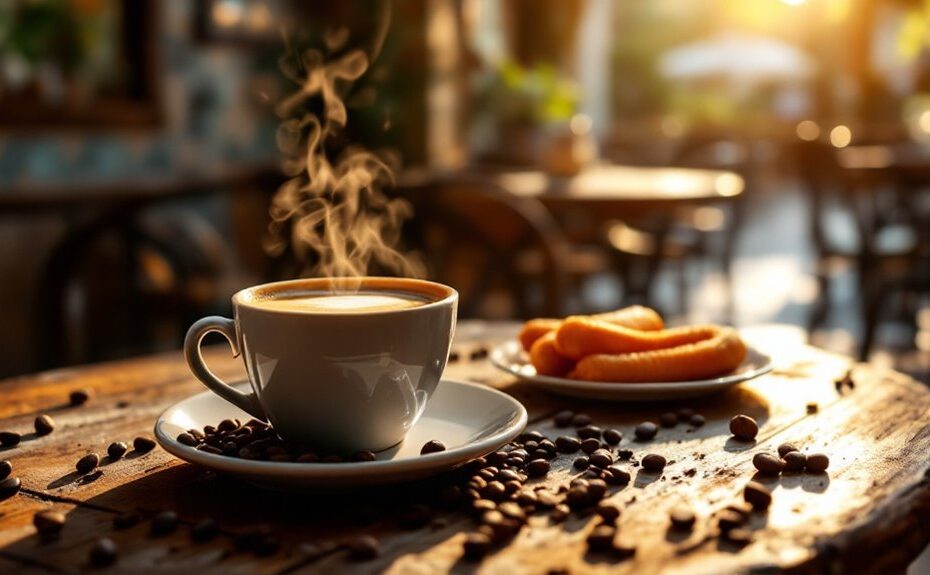







Spain's coffee scene has quietly evolved beyond its traditional roots, offering a refined experience that might surprise you. You'll find specialty cafes in cities like Madrid and Barcelona, where baristas treat coffee as an art form, blending global beans with local flair. But what sets these spots apart isn't just the quality—it's the stories behind each cup, from sustainable sourcing to innovative brewing methods. Whether you're sipping a cortado in Seville or exploring Málaga's laid-back roasteries, there's a depth to Spain's coffee culture that begs exploration. So, where does the best cup truly lie? The answer might not be what you expect.
Key Takeaways
- Specialty coffee in Spain, particularly in cities like Madrid and Barcelona, offers high-quality, globally sourced beans with artisanal roasting techniques.
- Traditional Spanish coffee drinks like café con leche and cortado remain popular, but specialty cafes emphasize flavor complexity and ethical sourcing.
- Regional coffee scenes in Seville, Málaga, Granada, and San Sebastian highlight sustainable practices, direct trade, and innovative brewing methods.
- Spanish brands like La Estrella and Bonka dominate the market, while specialty shops focus on seasonal varieties and eco-friendly practices.
- The best coffee in Spain combines tradition with innovation, offering a mix of classic espresso drinks and modern, experimental creations.
The Rise of Specialty Coffee in Spain
While Spain has long been known for its traditional coffee culture, the past decade has seen a remarkable rise in specialty coffee, transforming how locals and visitors experience their daily brew. You'll find a growing emphasis on artisanal coffee, with roasters in Madrid and Barcelona sourcing high-quality coffee beans from global origins, moving away from the torrefacto method—a traditional blend of sugar-roasted beans. This shift reflects a deeper appreciation for flavor complexity and ethical sourcing. In cities like Barcelona, innovative cafes experiment with seasonal varieties, while Madrid's baristas champion sustainability and education. The specialty coffee movement isn't just about taste; it's a cultural evolution, blending Spain's rich coffee heritage with modern techniques, creating spaces where every cup tells a story.
Madrid's Thriving Coffee Scene
Madrid's specialty coffee pioneers, like Toma Café, have redefined the city's coffee culture with minimalist spaces that emphasize simplicity and focus on the craft. They're not just serving coffee; they're educating through courses and workshops, while their bike-delivered specialty beans highlight a commitment to freshness and sustainability. These elements create a distinct experience that sets Madrid apart from traditional Spanish coffee norms.
Specialty Coffee Pioneers
As Spain's capital embraces a global coffee renaissance, Madrid's specialty coffee pioneers are redefining how locals and visitors experience their daily brew. Toma Café leads the charge with its minimalist spaces, bike-delivered beans, and coffee courses that cater to coffee enthusiasts. Hola Coffee, helmed by Spain's barista champion, and Misión Café, founded by a roasting runner-up, elevate the specialty coffee scene with their meticulous attention to quality and technique. Cafelito in Lavapiés blends freshly ground coffee with cultural events, creating a community-focused haven for any coffee lover. Unlike the more established coffee culture in Barcelona, Madrid's specialty cafes emphasize education, offering workshops and tastings to deepen your appreciation. These pioneers are transforming Madrid into a hub for global brewing methods and high-quality beans.
Minimalist Spaces & Courses
Though Madrid's coffee culture has long been rooted in tradition, its specialty coffee pioneers are reshaping the experience through minimalist spaces and immersive courses. At Toma Café, you'll find sleek, uncluttered interiors paired with coffee courses that range from barista training to brewing workshops, blending aesthetics with education. Hola Coffee, led by Spain's barista champion, elevates the experience with its modern, minimalist design and specialty coffee education, offering tastings that deepen your appreciation. Misión Café, founded by Spain's roasting runner-up, mirrors this approach, combining minimalist spaces with hands-on coffee workshops for enthusiasts. Meanwhile, Cafelito in Lavapiés merges minimalist charm with cultural events and coffee workshops, creating a cozy yet educational hub. These spaces redefine Spanish coffee culture, marrying minimalist elegance with a commitment to coffee education.
Bike-Delivered Specialty Beans
Building on Madrid's embrace of minimalist coffee spaces and education, the city's specialty coffee scene has taken innovation a step further with bike-delivered specialty beans. Toma Café leads this movement, offering high-quality coffee sourced from ethical producers and delivered fresh via bike. This method guarantees peak flavor while aligning with sustainability goals, reducing carbon footprints in Madrid's bustling urban lifestyle. The bike delivery service isn't just practical; it's a statement of commitment to quality and environmental responsibility. By combining modern logistics with artisanal traditions, Toma Café bridges the gap between convenience and craftsmanship. You'll find that this approach not only preserves the integrity of specialty beans but also enhances the city's coffee culture, making it a model for sustainable, high-quality coffee experiences.
Barcelona's Creative Coffee Culture
Barcelona's coffee culture thrives on a dynamic blend of tradition and innovation, where classic espresso drinks coexist with bold, experimental creations. When ordering coffee in a Spanish café, you'll find the familiar comfort of a cortado or café con leche, but Barcelona's specialty scene pushes boundaries. At Nmad Coffee Lab & Shop, seasonal coffee drinks highlight meticulous sourcing, while Koffee Barcelona pairs in-house roasted beans with artisanal pastries. Morrow Coffee redefines good coffee with inventive options like coffee and tonic, a revitalizing twist on the norm. Whether you prefer coffee with milk or coffee to go, the city's coffee served reflects its progressive ethos, emphasizing sustainability and creativity. Barcelona's coffee culture isn't just about caffeine—it's an experience that marries tradition with modern flair.
Seville's Focus on Quality Coffee
Seville's specialty coffee pioneers are reshaping the city's coffee culture by prioritizing sustainable roasting practices and artisanal craftsmanship. You'll find roasters like Torch Coffee Roasters and El Hombre Pez meticulously sourcing and roasting small-batch beans, ensuring each cup reflects their commitment to quality and environmental responsibility. This shift highlights Seville's move beyond traditional coffee norms, embracing innovation while staying rooted in ethical production.
Specialty Coffee Pioneers
While Spain is often celebrated for its wine and tapas, Seville has quietly emerged as a hub for specialty coffee, driven by a wave of pioneers redefining the city's coffee culture. Torch Coffee Roasters, founded by sisters Ana and Laura, exemplifies this shift, sourcing high-quality beans from ethical producers and emphasizing direct trade relationships with coffee farmers. Virgin Coffee focuses on simplicity, offering 100% arabica takeaway coffee, while El Hombre Pez, a microroastery, crafts small-batch roasts with precision. These pioneers prioritize artisanal roasting techniques, ensuring each cup reflects the bean's origin and complexity. By educating customers about brewing methods and the stories behind their coffee, Seville's specialty coffee scene bridges tradition and innovation, creating a culture that values quality, transparency, and connection.
Sustainable Roasting Practices
As sustainability becomes a cornerstone of modern coffee culture, Seville's specialty roasters are leading the charge by integrating eco-conscious practices into every step of production. Microroasteries like El Hombre Pez focus on small-batch, ethically sourced beans, ensuring quality while minimizing environmental impact. Torch Coffee Roasters exemplifies this ethos, sourcing directly from small farms and using eco-friendly packaging to reduce waste. Virgin Coffee, another standout, offers 100% arabica coffee, prioritizing sustainable, high-quality options for takeaway customers. Beyond roasting, Seville's coffee scene fosters collaboration with local communities to promote fair trade and environmentally conscious practices. Many roasters, including Torch, host workshops to educate consumers about sustainable coffee production, bridging the gap between farm and cup. In Seville, sustainability isn't just a trend—it's a commitment to preserving quality and the planet.
Málaga's Laid-Back Coffee Experience
Nestled along the sun-drenched coast of southern Spain, Málaga's coffee scene effortlessly blends tradition with innovation, offering a laid-back experience that mirrors the city's relaxed Mediterranean lifestyle. When you order a café in Málaga, you'll find Spanish coffee drinks served in a small cup, whether hot and cold, reflecting the simplicity and charm of Spanish cafés. At Café Central, a historic landmark since the 1950s, you'll savor a perfect balance of tradition and modern coffee culture. Meanwhile, Ma Coffee Shop stands out with its unique roasting techniques and welcoming vibe, while Tejeringos Coffee pairs exceptional brews with the city's best churros. Málaga's cafés often emphasize sustainability, sourcing beans from ethical producers around the world, ensuring every sip aligns with the city's easygoing yet conscientious spirit.
Granada and San Sebastian's Unique Offerings
Granada and San Sebastian each bring their own distinct flair to Spain's coffee culture, blending tradition with innovation in ways that reflect their unique identities. In Granada, La Finca stands out with its in-house roasted artisanal coffee and specialty brewing equipment, offering a cozy haven for coffee enthusiasts. Nearby, Lemon Rock combines a luxury hostel vibe with a lively bar area, drawing both locals and international visitors. Meanwhile, San Sebastian's Old Town Coffee, founded by Brazilian surfers, emphasizes sustainability and healthy coffee products, while Sakona, led by Spain's top barista, serves meticulously roasted specialty coffee. Both cities cater to discerning palates, but Granada leans into artisanal charm, while San Sebastian balances surf culture with cutting-edge coffee craftsmanship.
Traditional Spanish Coffee Drinks Explained
While Spain's coffee culture thrives on innovation, its traditional drinks remain deeply rooted in simplicity and ritual. The café solo is a straightforward black coffee, a potent espresso served in a small cup, perfect for purists. For a creamier option, the café con leche blends equal parts espresso and hot milk, offering a balanced, comforting drink often enjoyed at breakfast. The cortado strikes a middle ground, pairing espresso with a splash of steamed milk for a milder yet robust flavor. If you're seeking indulgence, the café bombón layers espresso with condensed milk, creating a sweet, velvety treat. For a spirited twist, the carajillo mixes espresso with brandy or rum, delivering a bold, warming finish. Each drink reflects Spain's love for coffee, tailored to different tastes and moments.
How to Order Coffee Like a Local
To order coffee like a local in Spain, you'll need to master the nuances of the language and the culture surrounding it. Start by specifying "café solo corto" for a short espresso or "muy corto" for an even smaller, stronger shot. If you prefer a milkier option, ask for "café con leche en vaso," served in a glass to cool faster. Avoid terms like "café manchado" or "latte macchiato," as they aren't commonly used and may confuse baristas. For more control over the coffee-to-milk ratio, request "café con leche con la leche aparte," which comes with milk in a separate jar. While "café para llevar" (coffee to go) is available in tourist areas, it's less common in traditional Spanish cafés, where savoring your drink is part of the experience.
Popular Coffee Brands and Production in Spain
Although Spain isn't a major coffee-producing country, it's home to the Canary Islands, the only European region where Arabica Typica coffee is cultivated, offering a unique local flavor profile. Spanish brands like La Estrella, Saimaza, Bonka, and Marcilla dominate the market, often blending traditional and torrefacto coffee, a method where sugar is caramelized during roasting for a bold, smoky taste. While these brands cater to local preferences, Italian giants like Segafredo and Illy are also widely available, appealing to those seeking smoother, less intense profiles. In cities like Madrid and Barcelona, specialty coffee shops often bypass torrefacto methods, sourcing high-quality beans globally for a more refined experience. Whether you prefer the robust local roasts or international options, Spain's coffee scene offers something for every palate.
Disclosure: As an Amazon Associate, I earn from qualifying purchases.






